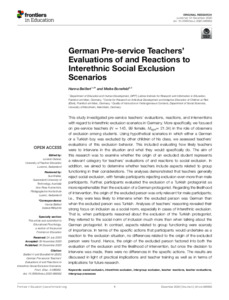|
German pre-service teachers' evaluations of and reactions to interethnic social exclusion scenarios
Beißert, Hanna
;
Bonefeld, Meike
![[img]](https://madoc.bib.uni-mannheim.de/58021/1.hassmallThumbnailVersion/feduc-05-586962.pdf)  Vorschau |
|
PDF
feduc-05-586962.pdf
- Veröffentlichte Version
Download (2MB)
|
|
DOI:
|
https://doi.org/10.3389/feduc.2020.586962
|
|
URL:
|
https://madoc.bib.uni-mannheim.de/58021
|
|
Weitere URL:
|
https://www.frontiersin.org/articles/10.3389/feduc...
|
|
URN:
|
urn:nbn:de:bsz:180-madoc-580215
|
|
Dokumenttyp:
|
Zeitschriftenartikel
|
|
Erscheinungsjahr:
|
2020
|
|
Titel einer Zeitschrift oder einer Reihe:
|
Frontiers in Education
|
|
Band/Volume:
|
5
|
|
Heft/Issue:
|
Article 586962
|
|
Seitenbereich:
|
1-12
|
|
Ort der Veröffentlichung:
|
Lausanne
|
|
Verlag:
|
Frontiers Media
|
|
ISSN:
|
2504-284X
|
|
Sprache der Veröffentlichung:
|
Englisch
|
|
Einrichtung:
|
Fakultät für Sozialwissenschaften > Unterrichtsqualität in heterogenen Kontexten (Juniorprofessur) (Karst 2016-2022)
|
|
Bereits vorhandene Lizenz:
|
 Creative Commons Namensnennung 4.0 International (CC BY 4.0) Creative Commons Namensnennung 4.0 International (CC BY 4.0)
|
|
Fachgebiet:
|
370 Erziehung, Schul- und Bildungswesen
|
|
Abstract:
|
This study investigated pre-service teachers' evaluations, reactions, and interventions with regard to interethnic exclusion scenarios in Germany. More specifically, we focused on pre-service teachers (N = 145, 99 female, Mage= 21.34) in the role of observers of exclusion among students. Using hypothetical scenarios in which either a German or a Turkish boy was excluded by other children of his class, we assessed teachers' evaluations of this exclusion behavior. This included evaluating how likely teachers were to intervene in the situation and what they would specifically do. The aim of this research was to examine whether the origin of an excluded student represents a relevant category for teachers' evaluations of and reactions to social exclusion. In addition, we aimed to determine whether teachers include aspects related to group functioning in their considerations. The analyses demonstrated that teachers generally reject social exclusion, with female participants rejecting exclusion even more than male participants. Further, participants evaluated the exclusion of a Turkish protagonist as more reprehensible than the exclusion of a German protagonist. Regarding the likelihood of intervention, the origin of the excluded person was only relevant for male participants; i.e., they were less likely to intervene when the excluded person was German than when the excluded person was Turkish. Analyses of teachers' reasoning revealed their strong focus on inclusion as a social norm, especially in cases of interethnic exclusion. That is, when participants reasoned about the exclusion of the Turkish protagonist, they referred to the social norm of inclusion much more than when talking about the German protagonist. In contrast, aspects related to group functioning were scarcely of importance. In terms of the specific actions that participants would undertake as a reaction to the exclusion situation, no differences related to the origin of the excluded person were found. Hence, the origin of the excluded person factored into both the evaluation of the exclusion and the likelihood of intervention, but once the decision to intervene was made, there were no differences in the specific actions. The results are discussed in light of practical implications and teacher training as well as in terms of implications for future research.
|
|
Zusätzliche Informationen:
|
Online-Ressource
|
 | Dieser Eintrag ist Teil der Universitätsbibliographie. |
 | Das Dokument wird vom Publikationsserver der Universitätsbibliothek Mannheim bereitgestellt. |
 Suche Autoren in Suche Autoren in
Sie haben einen Fehler gefunden? Teilen Sie uns Ihren Korrekturwunsch bitte hier mit: E-Mail
Actions (login required)
 |
Eintrag anzeigen |
|
|
 ORCID: 0000-0003-1940-2301
ORCID: 0000-0003-1940-2301



 Creative Commons Namensnennung 4.0 International (CC BY 4.0)
Creative Commons Namensnennung 4.0 International (CC BY 4.0) Suche Autoren in
Suche Autoren in